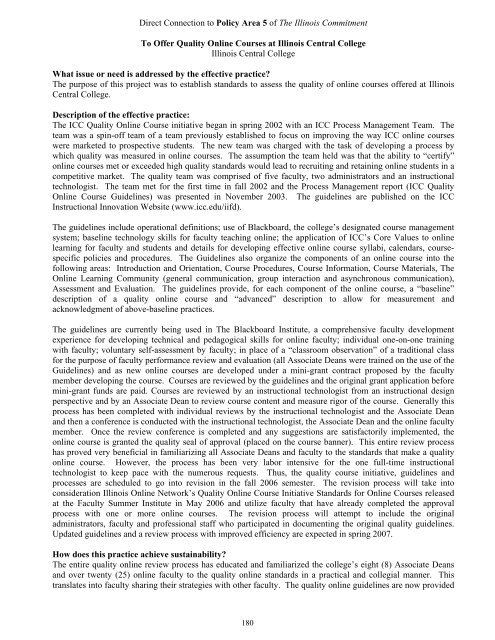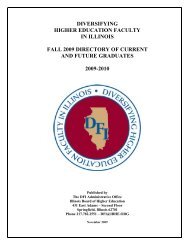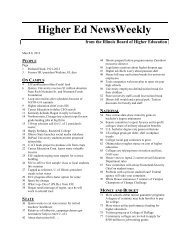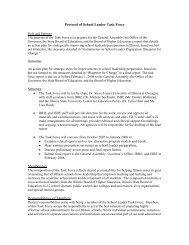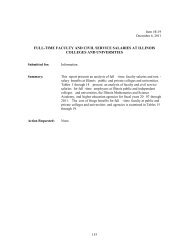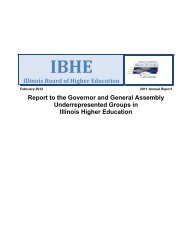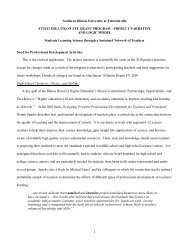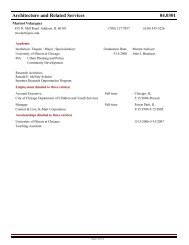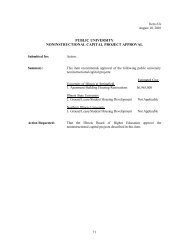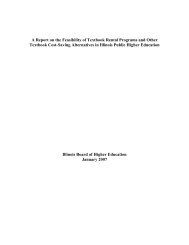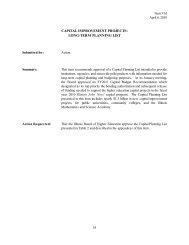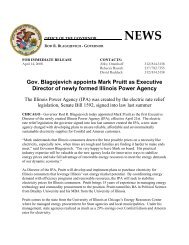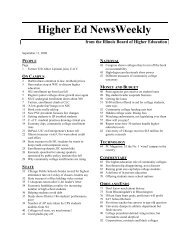Title of Effective Practice: - California Postsecondary Education ...
Title of Effective Practice: - California Postsecondary Education ...
Title of Effective Practice: - California Postsecondary Education ...
Create successful ePaper yourself
Turn your PDF publications into a flip-book with our unique Google optimized e-Paper software.
Direct Connection to Policy Area 5 <strong>of</strong> The Illinois Commitment<br />
To Offer Quality Online Courses at Illinois Central College<br />
Illinois Central College<br />
What issue or need is addressed by the effective practice?<br />
The purpose <strong>of</strong> this project was to establish standards to assess the quality <strong>of</strong> online courses <strong>of</strong>fered at Illinois<br />
Central College.<br />
Description <strong>of</strong> the effective practice:<br />
The ICC Quality Online Course initiative began in spring 2002 with an ICC Process Management Team. The<br />
team was a spin-<strong>of</strong>f team <strong>of</strong> a team previously established to focus on improving the way ICC online courses<br />
were marketed to prospective students. The new team was charged with the task <strong>of</strong> developing a process by<br />
which quality was measured in online courses. The assumption the team held was that the ability to “certify”<br />
online courses met or exceeded high quality standards would lead to recruiting and retaining online students in a<br />
competitive market. The quality team was comprised <strong>of</strong> five faculty, two administrators and an instructional<br />
technologist. The team met for the first time in fall 2002 and the Process Management report (ICC Quality<br />
Online Course Guidelines) was presented in November 2003. The guidelines are published on the ICC<br />
Instructional Innovation Website (www.icc.edu/iifd).<br />
The guidelines include operational definitions; use <strong>of</strong> Blackboard, the college’s designated course management<br />
system; baseline technology skills for faculty teaching online; the application <strong>of</strong> ICC’s Core Values to online<br />
learning for faculty and students and details for developing effective online course syllabi, calendars, coursespecific<br />
policies and procedures. The Guidelines also organize the components <strong>of</strong> an online course into the<br />
following areas: Introduction and Orientation, Course Procedures, Course Information, Course Materials, The<br />
Online Learning Community (general communication, group interaction and asynchronous communication),<br />
Assessment and Evaluation. The guidelines provide, for each component <strong>of</strong> the online course, a “baseline”<br />
description <strong>of</strong> a quality online course and “advanced” description to allow for measurement and<br />
acknowledgment <strong>of</strong> above-baseline practices.<br />
The guidelines are currently being used in The Blackboard Institute, a comprehensive faculty development<br />
experience for developing technical and pedagogical skills for online faculty; individual one-on-one training<br />
with faculty; voluntary self-assessment by faculty; in place <strong>of</strong> a “classroom observation” <strong>of</strong> a traditional class<br />
for the purpose <strong>of</strong> faculty performance review and evaluation (all Associate Deans were trained on the use <strong>of</strong> the<br />
Guidelines) and as new online courses are developed under a mini-grant contract proposed by the faculty<br />
member developing the course. Courses are reviewed by the guidelines and the original grant application before<br />
mini-grant funds are paid. Courses are reviewed by an instructional technologist from an instructional design<br />
perspective and by an Associate Dean to review course content and measure rigor <strong>of</strong> the course. Generally this<br />
process has been completed with individual reviews by the instructional technologist and the Associate Dean<br />
and then a conference is conducted with the instructional technologist, the Associate Dean and the online faculty<br />
member. Once the review conference is completed and any suggestions are satisfactorily implemented, the<br />
online course is granted the quality seal <strong>of</strong> approval (placed on the course banner). This entire review process<br />
has proved very beneficial in familiarizing all Associate Deans and faculty to the standards that make a quality<br />
online course. However, the process has been very labor intensive for the one full-time instructional<br />
technologist to keep pace with the numerous requests. Thus, the quality course initiative, guidelines and<br />
processes are scheduled to go into revision in the fall 2006 semester. The revision process will take into<br />
consideration Illinois Online Network’s Quality Online Course Initiative Standards for Online Courses released<br />
at the Faculty Summer Institute in May 2006 and utilize faculty that have already completed the approval<br />
process with one or more online courses. The revision process will attempt to include the original<br />
administrators, faculty and pr<strong>of</strong>essional staff who participated in documenting the original quality guidelines.<br />
Updated guidelines and a review process with improved efficiency are expected in spring 2007.<br />
How does this practice achieve sustainability?<br />
The entire quality online review process has educated and familiarized the college’s eight (8) Associate Deans<br />
and over twenty (25) online faculty to the quality online standards in a practical and collegial manner. This<br />
translates into faculty sharing their strategies with other faculty. The quality online guidelines are now provided<br />
180


